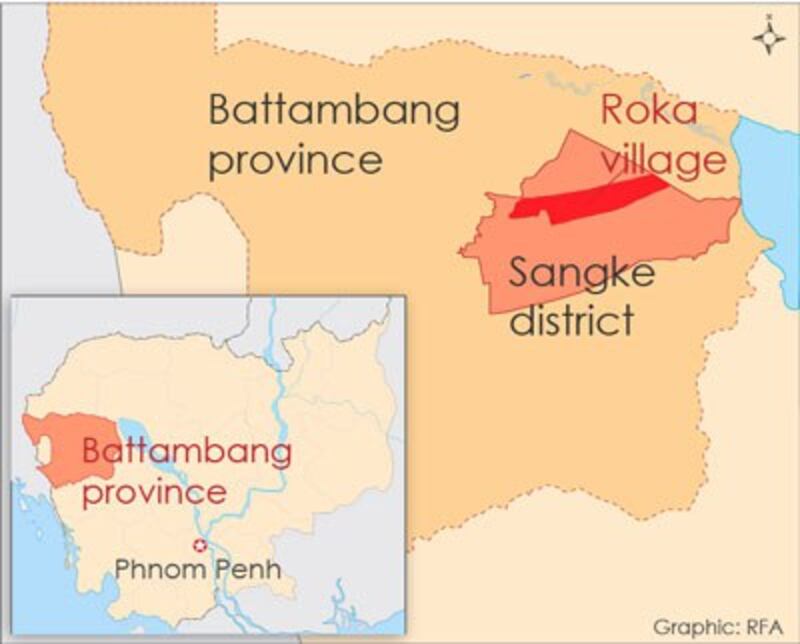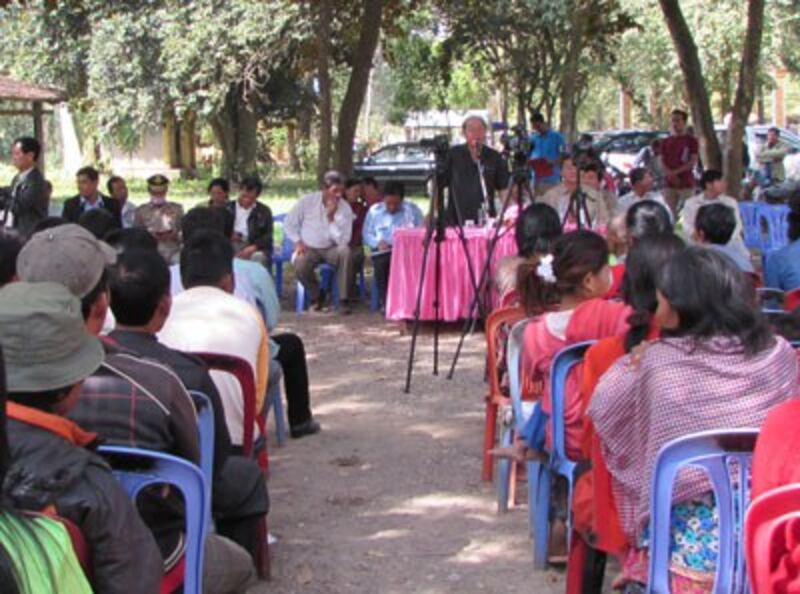Cambodian Prime Minister Hun Sen on Thursday called for a thorough investigation into an apparent mass HIV infection in a remote northwestern commune, believed to have been spread by contaminated needles used for medical treatment by an unlicensed health care worker.
Hundreds of villagers in Roka commune, in Battambang province’s Sangke district, have rushed to get tested at a local clinic since reports of the infections emerged last week, and Health Ministry officials said Wednesday that 106 people have been confirmed positive for HIV—the virus that causes AIDS.
Hun Sen urged residents to remain calm and wait for teams from the Ministry of Health and the World Health Organization (WHO), who arrived in Roka on Tuesday, to review the high number of positive results—an infection rate authorities have said is unprecedented in the country.
“I met with Minister of Health Mam Bunheng about why [more than] 100 people out of [nearly] 1,000 [people tested] were infected with HIV,” the prime minister said in a televised address.
“This is very serious. I asked him whether the information was confirmed. But there may be a virus involved other than HIV,” he said.
Hun Sen said that the high rate of infection required a more thorough investigation and called for tests of the equipment used to verify that villagers had contracted HIV—including children as young as three years of age and elderly residents as old as 82.
“Please don’t make any assumptions yet—we must first make use of all our available resources and technology,” he said.
The prime minister called on villagers to respect the privacy of affected families and refrain from discriminating against them.
Hun Sen also appealed to the residents of Roka not to harm a local unlicensed healthcare worker they believe is responsible for spreading the infections after they received medical treatment from him.
He said local authorities must be allowed to question the worker to determine what he knows about the suspected cases of HIV.
“In order to ensure accuracy, we must provide security to the health care provider and his family,” Hun Sen said.
“I appeal to the people [in Roka], don’t try to kill him or we will lose all of the information [about the health scare].”
Health worker questioned

Local media reported that Yem Chhrem—an unlicensed medical worker serving Roka commune who had gone missing in recent days—had returned to the area and was taken into protective custody by local authorities on Wednesday.
As the number of positive HIV cases in the area grew to more than 100, residents have grown angry, according to a report by the Phnom Penh Post, which cited the commune's deputy chief Seoum Chhorm as saying that villagers believed Yem Chhrem had caused the infections with contaminated needles.
"Police cannot stop us killing him," Seoum Chhorm, who tested positive for HIV along with his wife and two grandchildren, told the Post.
But the Cambodia Daily reported that Yem Chhrem had willingly met with authorities on Wednesday and quoted provincial penal police chief Seng Luch as saying that he was still being investigated.
“We invited him for questioning because many people accused him of causing the spread of HIV … we don’t dare to accuse him yet,” Seng Luch said, adding that police planned to detain Yem Chhrem overnight and carry out a search of his home.
Meanwhile, Minister of Health Mam Bunheng visited Roka Thursday to comfort villagers and encourage them to trust the heath care professionals in the commune.
“We have experts to investigate the disease,” he told residents.
“I appeal to all people to cooperate with our health experts. We will send additional experts soon to join authorities in the investigation,” he said.
Agence France-Presse quoted Mean Chhi Vun, director of the Health Ministry's National Center for HIV/AIDS, Dermatology and STDs, as saying that health experts were double-checking the results of the recent blood tests.
"We need to do more confirmation tests," he said.
Ongoing fight

Cambodia has won praise from the international community for its recent work in fighting HIV/AIDS.
Last week, Prime Minister Hun Sen committed to stopping new HIV infections in Cambodia by 2020 as the government allocated U.S. $3.7 million of the national budget to HIV treatment from 2015 to 2017—the first time it had earmarked funds for the country’s treatment program.
According to UNAIDS, new HIV infections in Cambodia dropped by 67 percent from 3,500 in 2005 to 1,300 in 2013.
Cambodia’s National AIDS Authority says the rate of HIV infection among people aged 15 to 49 has declined from 0.6 percent in 2013 to 0.4 percent in 2014.
More than two-thirds of the 75,000 people living with HIV in the country receive antiretroviral therapy—the highest percentage of treatment access in the region, UNAIDS said.
Reported by RFA’s Khmer Service. Translated by Samean Yun. Written in English by Joshua Lipes.
